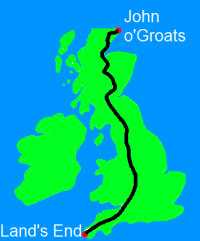Or search by topic
Number and algebra
Geometry and measure
Probability and statistics
Working mathematically
Advanced mathematics
For younger learners
Nutrition and Cycling




Nutrition and Cycling printable worksheet part 1 (questions)
Nutrition and Cycling printable worksheet part 2 (cards)
Andy is preparing to cycle from Land's End to John o'Groats.
He will undertake some training rides before the big ride.
These cards contain some information about his training schedule, details about the big ride, and his nutritional needs when he is cycling.
Have a look at the cards and try to make sense of the information.
Then use the information to help you to answer the questions below.
- Andy is planning a short training ride.
He wants to take either bananas or cheap cereal bars with him as on-the-road snacks.
How many bananas would he need to take, to minimise the calorie deficit at the end of his ride? How many cheap cereal bars?
(The calorie deficit is the difference between the calories Andy uses during his cycle ride, and the calories he consumes before and during the ride.)
- After his training rides, Andy is ready to cycle from Land's End to John o'Groats.
How many days will it take?
Work out some of Andy's different options for carrying and consuming on-the-road snacks and drinks.
How can he maximise his consumption while cycling?
Together with his meals, can he consume enough calories each day so that he doesn't lose any weight?
How much of his calorie intake will need to be provided each day through off-the-road snacks?
Possible extension
The Fastest Cyclist follows on from this problem and challenges you to devise a winning cycling and nutrition plan if Andy is racing to reach John o'Groats.
You may also like
Golden Thoughts
Rectangle PQRS has X and Y on the edges. Triangles PQY, YRX and XSP have equal areas. Prove X and Y divide the sides of PQRS in the golden ratio.
At a Glance
The area of a regular pentagon looks about twice as a big as the pentangle star drawn within it. Is it?
Contact
A circular plate rolls in contact with the sides of a rectangular tray. How much of its circumference comes into contact with the sides of the tray when it rolls around one circuit?

